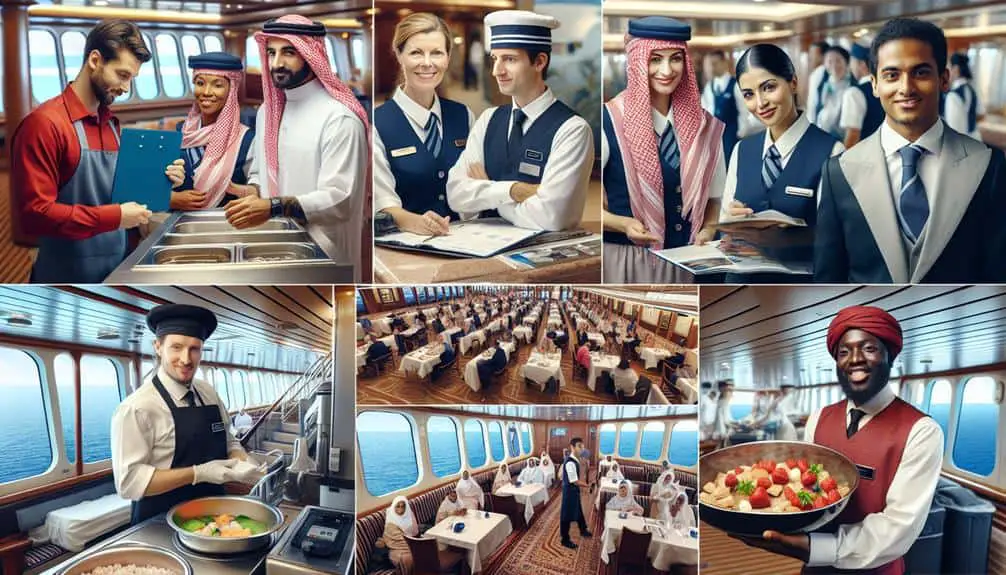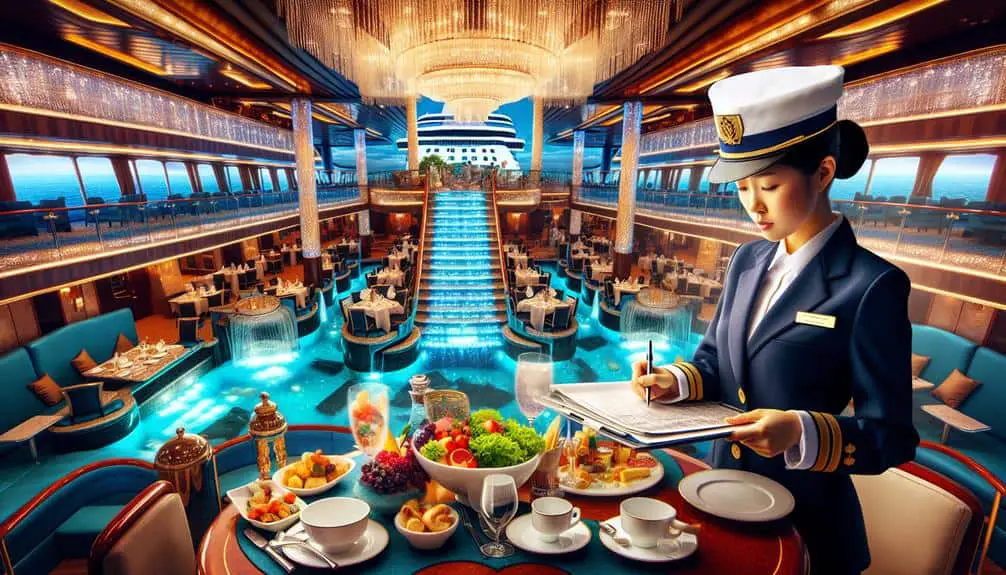When on a cruise ship, your duties involve ensuring food safety and hygiene adherence, delivering exceptional customer service, managing inventory effectively, collaborating with kitchen colleagues, and accommodating various guest dietary needs. By following protocols, conducting food inspections, and ensuring sanitation, you guarantee passenger safety. Your communication skills and utilization of feedback drive guest satisfaction improvements. Mastery of inventory control and teamwork coordination enhance operational efficiency. You expertly handle guest dietary requirements, receive training on diverse preferences, and liaison between patrons and the kitchen staff. Your key responsibilities create a well-rounded cruise experience for all on board.
Key Points
- Follow strict food safety and hygiene protocols
- Provide excellent customer service and exceed expectations
- Manage inventory efficiently to minimize waste and reduce costs
- Collaborate with kitchen staff for smooth operations
- Handle guest dietary requirements with expertise
Ensuring Food Safety and Hygiene
To maintain high standards of food safety and hygiene on a cruise ship, crew members must diligently follow strict protocols and guidelines. Food inspection is a critical aspect of guaranteeing that all food served onboard is safe for consumption. Regular checks on food storage areas, preparation surfaces, and equipment are essential to prevent contamination and foodborne illnesses. Sanitation practices, such as proper handwashing techniques and cleaning procedures, play a crucial role in maintaining a hygienic environment.
Staff training is key to upholding food safety standards. Crew members must undergo thorough training programs that cover proper food handling, storage, and preparation techniques. Adherence to these guidelines is non-negotiable to prevent any lapses that could compromise the health of guests and crew members. Regular audits and assessments help monitor staff performance and ensure compliance with food safety protocols.
Providing Excellent Customer Service
Maintaining exceptional customer service standards on a cruise ship involves consistently exceeding passengers' expectations and creating memorable experiences throughout their journey. Guest satisfaction is vital in the cruise industry, as it directly impacts overall guest experience and influences repeat business.
Crew members play a key role in ensuring guest satisfaction by demonstrating outstanding communication skills. Effective communication, both verbal and non-verbal, enables crew members to understand passengers' needs and preferences, anticipate potential issues, and provide prompt solutions.
Guest satisfaction surveys and feedback mechanisms are commonly used to gauge the level of service provided. Analyzing this data allows cruise lines to identify areas for improvement and tailor training programs to enhance communication skills among crew members.
By actively listening to passengers, acknowledging their feedback, and addressing concerns promptly, cruise ship crew members can create a positive and lasting impression, ultimately leading to increased guest satisfaction and loyalty.
Managing Inventory and Supplies
Efficiently managing inventory and supplies onboard a cruise ship is essential for ensuring smooth operations and meeting the needs of passengers and crew. Inventory control and supply management are pivotal aspects of this responsibility. To excel in this area, crew members must master stock rotation techniques to prevent spoilage and guarantee the availability of fresh supplies. Understanding ideal ordering levels is crucial to prevent shortages while avoiding excess stock that could lead to wastage.
By implementing robust inventory control practices, crew members can minimize waste, reduce costs, and enhance overall operational efficiency. Monitoring inventory levels regularly and utilizing inventory management systems can streamline the process, enabling timely replenishment of supplies. Additionally, maintaining accurate records of stock levels and consumption patterns is key to forecasting future needs and adjusting ordering levels accordingly.
Successful management of inventory and supplies contributes significantly to the seamless functioning of a cruise ship, ensuring that both passengers and crew have access to the necessary resources throughout the voyage.
Collaborating With Kitchen Staff
Collaboration with kitchen staff plays a pivotal role in optimizing operational efficiency and enhancing service quality onboard a cruise ship. Effective kitchen communication is essential for ensuring seamless coordination between different departments. By fostering strong teamwork dynamics, crew members can streamline food preparation processes, minimize wait times, and deliver exceptional dining experiences to guests.
To excel in collaborating with kitchen staff, it's important to maintain open lines of communication. Clear and concise communication regarding menu changes, dietary restrictions, and special requests is necessary for ensuring that meals are prepared accurately and promptly. Additionally, establishing efficient teamwork dynamics within the kitchen can lead to improved productivity and a more cohesive work environment.
Handling Guest Dietary Requirements
To guarantee exceptional guest satisfaction on a cruise ship, skillfully addressing and accommodating guest dietary requirements is essential. Crew members need specialized training to handle a variety of dietary needs efficiently. This training equips them to understand different dietary restrictions, such as allergies, religious requirements, or personal preferences. By being well-versed in various dietary considerations, crew members can proactively assist guests in choosing suitable menu options and make sure their dining experience is enjoyable.
Guest satisfaction is directly linked to how effectively crew members manage dietary requirements. When guests feel that their dietary needs are understood and catered to, it enhances their overall experience onboard. Crew members play a vital role in liaising between guests and the kitchen staff to make sure that meals are prepared according to specific requirements. Through clear communication and attention to detail, crew members can create a positive dining experience for all guests, regardless of their dietary restrictions. By prioritizing guest satisfaction in this aspect, cruise ship crew members contribute significantly to the overall success of the voyage.
Frequently Asked Questions
What Qualifications Are Required to Work as a Cruise Ship Crew Member?
To become a cruise ship crew member, qualifications such as relevant training, job requirements, and certifications are necessary. These serve as the foundation for a successful career at sea, ensuring competence and professionalism.
How Do Crew Members Handle Emergencies and Safety Procedures on Board?
In emergencies, crew members conduct regular drills to guarantee safety protocols are followed efficiently, overcoming language barriers and cultural differences through clear communication and training. This meticulous preparation safeguards passengers and facilitates effective responses.
What Opportunities for Career Advancement Are Available for Cruise Ship Crew Members?
You can propel your career on a cruise ship through various avenues like promotions, job rotations, and training opportunities. This dynamic environment fosters career growth and skill development, offering a path to advancement.
How Do Crew Members Handle Cultural Differences and Language Barriers With Guests?
In a diverse cruise ship environment, crew members exhibit cultural sensitivity by adapting communication strategies to bridge language barriers with guests. Understanding customs and using gestures can enhance interactions, creating memorable experiences for all.
What Is the Daily Schedule and Work Hours Like for Cruise Ship Crew Members?
Balancing time management and shift flexibility is vital for cruise ship crew members. Your daily schedule can vary, demanding adaptability and organization. Embrace the dynamic work hours as opportunities to excel in a fast-paced environment.




